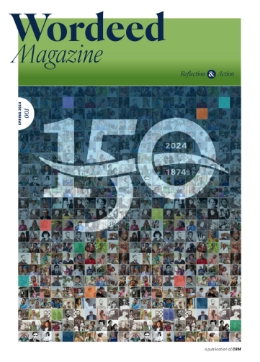As a child growing up in a western Canadian Baptist church, I felt that CBM Field Staff were akin to Christian action stars; dare I say the “Sylvester Stallones” of Baptist ministries. Clad in gingham and khaki, their stories of far-off places and risks taken for the kingdom were the stuff of legend. In my memory these people radiated courage, clarity, and tested resolve—they were confident they were called to the field to serve.
This past fall, I became one of CBM’s newest Field Staff as I joined the MENA (Middle East and North Africa) team based in Beirut, Lebanon. But courage is hardly the word I would use to describe my own daily service, as I attempt to order a falafel with correct Arabic grammar.
For some, determining your call is a logical use of natural talents to meet a need in the world. Others feel that calling involves direction by the Holy Spirit to work within specific parameters revealed through prayer, opportunity, and affirmation by one’s spiritual community. Still others would say that significant feelings such as passion or peace are markers of calling.
Throughout CBM’s 150 years, many Field Staff have been sent to serve the global Church. Each has felt called, but those callings have worked themselves out in different ways.
Muriel Bent saw a natural connection between her skills as a nurse and providing medical care to rural communities in India with CBM.
Tom* received a call to train pastors in Asia before he was ready (didn’t speak the language, the country restricted outsiders, no pastoral experience). But the idea “stuck in [his] soul.” It wasn’t until many years down the road, after ministering with Asian communities in Canada, that Tom and his wife served with CBM in Asia doing just as he had been told decades before—training pastors.
For Elie Haddad, MENA Team Leader, passion is integral to calling, but it can come after the decision. He and his wife, Mireille, originally from Lebanon, had a rich church community in Canada and ministries within the business world. They had no desire to leave, yet over time they heeded the call to serve in their homeland. Elie shares, “There was a sense of peace about the decision—that was very important—but the strong passion and desire to work [in the Middle East] came further down the road. Now we are certain our path is here.”
Like so many, my path to service was slow and winding. My first encounter with Lebanon happened years ago when I had wrapped up my master’s degree in education and impulsively left a steady job for an internship program with the Mennonite Central Committee. MCC sent me to Lebanon during what turned out to be one of its most turbulent years that included a revolution, economic catastrophe, the pandemic, and a devastating explosion in the Beirut harbour.
Afterwards, the pull back to Beirut was insistent despite the instability and struggles I would face as well as not knowing the work I was meant to do. The decision to return came first, then the opportunity, and eventually the peace.
I had plenty of opportunity to use the skills and experience I had picked up over the years to work with CBM’s partner in Lebanon, THIMAR. I have a background in education, youth ministry, community development, and relief project monitoring. This, along with the outpouring of support from my community, was the confirmation I needed.
Now, I am humbled as I learn a new culture, language, and how ministry works here. I am totally dependent on the kindness and mentorship of my Lebanese family and co-workers. And I am simultaneously inspired and energized by the Kingdom work of the Church here.
And I know I’m not alone.
Emad and Almess Botros have served with CBM in Lebanon since 2015. Emad notes, “Calling does not necessarily change, but it grows, matures, and becomes clearer.”
The theme of change is evident in the stories of the Field Staff I’ve listened to—rejected visas, displacement, career changes, long pauses, etc. Yet they are also marked with persistence, especially in the face of risk.
Many Field Staff served during times of Christian persecution, political instability, and war. A month after I arrived in Lebanon with CBM, the Middle East was plunged into turmoil. On October 7, attacks on Israeli citizens by Hamas militants led to the mass killing of Palestinians and displacement of over 90,000 Lebanese citizens from cross-border airstrikes.
The Harveys had been serving in Angola when a terrible civil war broke out. Charlie explains that the well-worn phrase “the safest place is in God’s will” can be misleading. “God doesn’t have an obligation to keep us (physically) safe,” he argues. While you should absolutely make prudent choices, “if you’re living for Jesus, and really listening, you’re likely going to experience risks.” Essentially, safety isn’t really part of the job description of following one’s call.
While there are many unknowns, one thing is clear about calling—the entire body of the Church has been given a call. Elie explains that the “sent-out-ness” of the Church is fundamental. Some may be called overseas, but all are called to follow Christ by serving others, binding wounds, and pursuing justice in building God’s Kingdom.
Theologian, Os Guinness, defines calling as: “the truth that God calls us to himself so decisively that everything we are, everything we do, and everything we have is invested with a special devotion, dynamism and direction lived out as a response to his summons and service.”
I think back to the resolute and fearless missionary I imagined as a child. My experience now reveals something markedly more human. I’m beginning to see the khaki and gingham not so much a sign of supernatural strength and courage, but of a chosen vulnerability. If there is a thread that connects Field Staff past, present, and future it is that we each made the choice to go out. And out comes with risk.
We’ve chosen to expose ourselves to what Suzanne Taylor beautifully referred to as “good grief”—the simultaneous breaking yet deepening and softening of the heart that comes with living and serving next to the marginalized. And because of this exposure, we witness God move in powerful ways.
How does calling work exactly? I still don’t know. I’m just so glad it does. Because I am convinced that the history of CBM is woven by threads of individuals who followed theirs, however mysterious and meandering.
* Last name omitted for security reasons.




